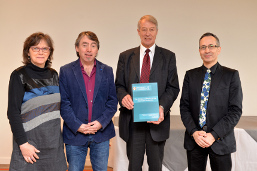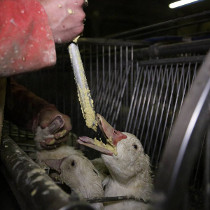Force-feeding, routinely used in foie gras production, is one of the most extreme forms of torture still used to produce food. To produce rather unhealthy food, one might add.
For the last couple of weeks of their lives, geese (the species traditionally used for foie gras) and ducks (the most commonly used species today) are force-fed twice daily by inserting a tube into their throat and pumping in huge quantities of maize mash.
As one might expect, this violent treatment causes the animals countless problems: lesions to the oesophagus, respiratory problems, fear, distress, pain, and higher mortality levels than found in similar farms that don’t practise force-feeding. It also causes abnormalities in standing posture and gait due to the enlarged liver, and other pathologies such as bone fragility and foot lesions.
As long ago as 1998, a report of the EU Scientific Committee on Animal Health and Animal Welfare concluded that “force-feeding, as currently practised, is detrimental to the welfare of the birds”. Nevertheless, no effective action has been taken at the institutional level to ban it. Even in countries where force-feeding is banned, it is still legal to sell foie gras produced that way.
To compound the problem, in 2008 an EU Regulation was unanimously approved by all EU Member States that established the minimum liver weights to be used for foie gras production (300g for ducks and 400g for geese). Such liver weights are enormous for these animals, so in effect the Regulation established the need to force-feed in foie gras production, where livers grow to between 7 and 10 times their normal size.
Most of the production and consumption of foie gras takes place in France (around 80% of production and 90% of consumption), but force-feeding is still practised in four other EU countries (Belgium, Bulgaria, Hungary and Spain) and in some countries outside the EU, such as China, Canada, USA and Ukraine. Force-feeding is illegal in most European countries and in other countries around the world, including Israel and Poland, where there used to be foie gras production. Nevertheless, it is still legal in all countries to sell foie gras produced by force-feeding, with the single honourable exception of India.
Over the last few months, the prestigious Animal Welfare Information Service of Cambridge University, led by the internationally renowned Prof. Donald Broom, conducted a study on ‘The Welfare of Ducks during Foie Gras Production’. Dr Irene Rochlitz and Prof. Broom himself reviewed the available scientific studies on this issue and produced a thorough analysis, with some compelling conclusions.

Presentation of the Report. Ann DeGreef, Michel Vandenbosch, Prof. Donald M. Broom, Adolfo Sansolini - Brussels, Belgium, December 2015 (Photo: GAIA)
The study highlights the huge suffering that animals are forced to endure in order to produce a food ‘delicacy’ that is not only harmful to animals but also – because of its high fat content – unhealthy for humans. The Cambridge study warns, ”There may be a public health risk associated with foie gras consumption. Duck or goose-derived foie gras contains amyloid protein, which could hasten the development of amyloidosis in a susceptible human population.”
Earlier this month, the Cambridge report was officially presented in Brussels by Michel Vandenbosch, President of GAIA, together with Prof. Broom, who explained the methodology of the study and highlighted some of its findings.
“The results of this report by the University of Cambridge are unequivocal,” Prof. Broom said. “The practice of force-feeding causes a sharp deterioration in the welfare of the ducks.”
I was glad to attend this event and to be involved in GAIA’s valuable work aimed at ending force-feeding throughout Europe. Will European governments do what is good for animal welfare and human health, or continue to close their eyes to the scandal of force-feeding?
You can learn more and download the full report on the GAIA website.
Free subscription to the AnimalWelfareAndTrade Newsletter: click here
Follow AnimalWelfareAndTrade on Twitter: click here
Follow AnimalWelfareAndTrade on Facebook: click here


